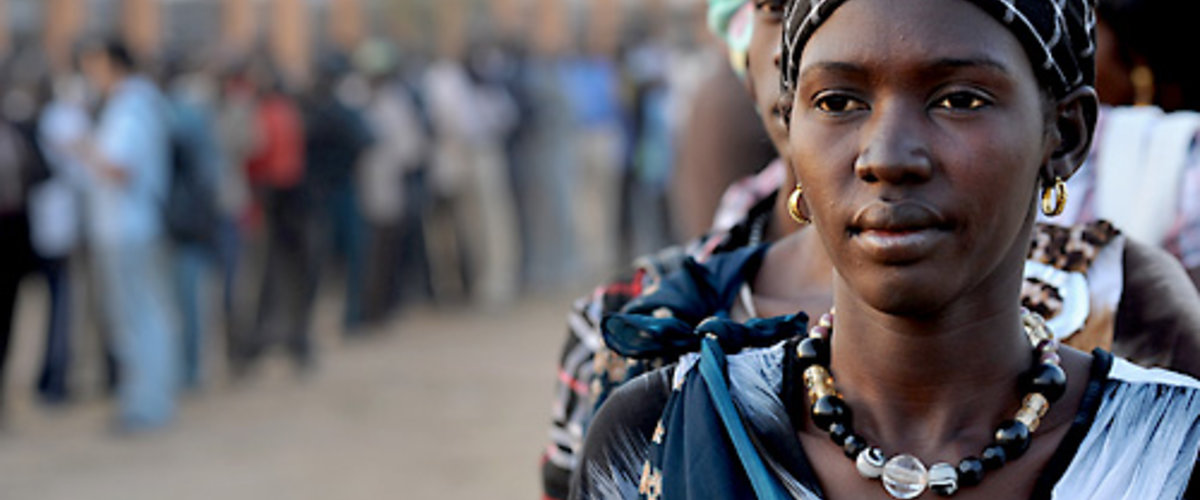Jackson Joshua Jada walked up to a polling centre in the Kator district of Juba at 1 a.m. on 9 January to ensure he would be its first voter in Southern Sudan's long-awaited referendum on self-determination.
The moment was a long time coming for Mr. Jada, who lost his father, brothers and other close relatives in the carnage of Sudan's second civil war. The prospect of a seven-hour-long wait before the start of polling failed to faze him.
"I lost my family, and now I do not want to lose Southern Sudan," said Mr. Jada, who left his wife and seven children behind in Khartoum to vote in the regional capital. "I will vote for freedom to fulfill my dream and the dream of my people."
Amid joyous ululating and long queues, hundreds of thousands of registered voters descended on polling centres across Southern Sudan on the first day of balloting to have their say in the future of the impoverished region.
Only three of the 2,638 polling centres set up across Southern Sudan failed to open as scheduled on 9 January, which also marked the sixth anniversary of the signing of the 2005 Comprehensive Peace Agreement. By the end of the day, an estimated 20 per cent of the 3.7 million registered voters in the country's 10 southern states had trooped to the polls, according to the Southern Sudan Referendum Commission (SSRC).
With six days of voting still remaining, there seemed little doubt that voter turnout would surpass the 60 per cent threshold established by the 2009 Southern Sudan Referendum Act to make the outcome legally binding. That translates to 2,359,533 votes.
"It is proceeding very, very smoothly," said SSRC chairperson Mohammed Ibrahim Khalil on the third day of voting. "There doesn't seem to be any fear of not reaching the 60 percent limit."
The mood and levels of participation were quite different in the country's 15 northern states, where over 116,000 southern residents had registered to vote.
Only one man stood outside a polling centre in the Morda district of Omdurman when it opened its doors at 8:15 a.m. on the first day of voting.
Sadiq Ibrahim was born in Khartoum and has never visited his family's ancestral homeland in the Western Bahr El-Ghazal State county of Raga. But he still felt it was his duty to register his support for the continued unity of the country.
"Unity might still happen but with a new set of morals, ideas and opinions," said 46-year-old Ibrahim. "I am optimistic."
An estimated 14 per cent of registered voters in North Sudan went to polling centres on the first day of voting, according to SSRC member Paulino Wanawilla Unango.
The SSRC and its Juba-based bureau received high praise at home and abroad for spearheading preparations for the referendum and starting the vote on time.
"The commissioners, bureau members and their staffs have carried out their responsibilities under an extremely tight timetable in a politically sensitive environment," said UNMIS Regional Coordinator David Gressly at a 6 January press conference. "Thanks to their efforts, the many skeptics who never thought Southern Sudan would be ready to hold its referendum (on schedule) were proven wrong."
UNMIS and the United Nations Integrated Referendum and Electoral Division (UNIRED) provided vital logistical support and technical advice to the SSRC during the countdown to 9 January.
Nearly 340 UNIRED staff members worked closely with Sudanese referendum officials throughout the country. Domestic flights funded by the UN Development Programme's Basket Fund delivered over 1.2 million kilograms of referendum materials in the south.
During a six-day period ending on 4 January, UNMIS aircraft transported over 29,000 kilograms of referendum materials to 50 remote drop-off points in the Southern Sudanese hinterland that were inaccessible by road.
UNMIS also opened 19 referenda support bases in nine southern states to facilitate assistance to the referendum process at the county level.
UN Police advisers serving with UNMIS provided referendum security training to approximately 17,600 members of the Southern Sudan Police Service and 4,500 officers with the Sudan Federal Police in the north.
The SSRC is expected to make a preliminary declaration of results on 2 February. If no legal appeals are filed, final official figures could be available as early as 7 February.
 UN
UN United Nations Peacekeeping
United Nations Peacekeeping





